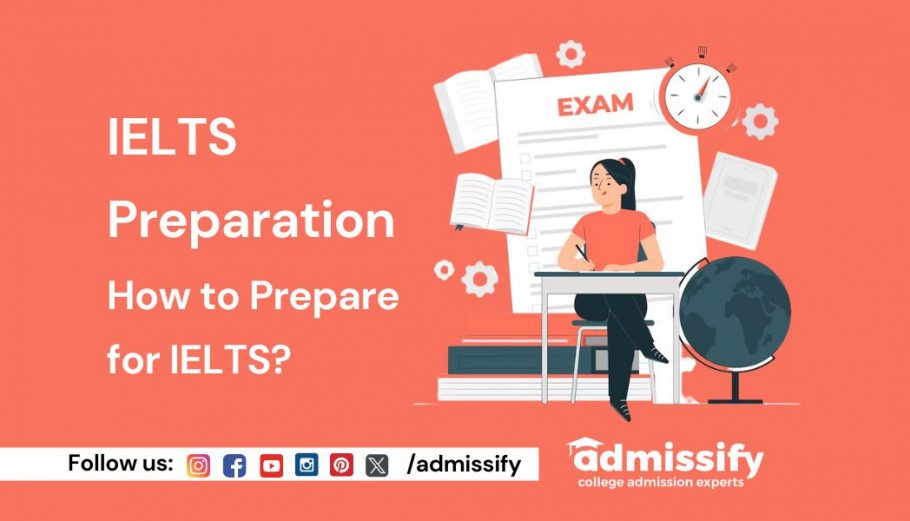Last Updated on December 13, 2024
Honestly, the time needed for IELTS preparation depends on your goals and aims. To effectively start your IELTS preparation, engaging in consistent study and practice with sample papers is essential. Beginners should plan for 2 to 3 months of dedicated IELTS preparation to reach the ultimate score between 7 and 9 bands.
You can start your IELTS preparation by exploring updated study materials and leveraging online resources. Enrolling in a coaching center can provide expert guidance throughout your preparation journey. Prestigious universities such as MIT, ICL, Oxford, and Harvard University typically require a minimum band score of 7.0.
To excel in your IELTS preparation, concentrate on IELTS practice with mock tests daily. Remember, IELTS practice does not have to be rigorous- your aim should be to improve your language abilities and get a successful letter of acceptance.
IELTS Preparation: A Breakdown of the IELTS Test
General
- There are two types: Academic and General Training
- All test takers take the same Listening and Speaking tests
- Different Reading and Writing Tests for Academic vs General
Reading
- 40 questions testing a range of reading skills (gist, details, main ideas, skimming, etc.)
- 60 minutes total test time
Speaking
- It can be taken up to a week before or after the other tests
The key things to understand about IELTS practice for the IELTS exam are:
- There are Academic and General Training versions
- Tests are the same for Listening and Speaking
- Differences in Reading and Writing tests
- Reading is 40 questions in 60 minutes
- Speaking can be taken a week before or after the other tests
IELTS Preparation: Types of IELTS Reading Questions
Many people often overlook the importance of understanding the IELTS Reading Section before beginning their IELTS preparation-
| Multiple choice | Sentence completion |
| Identifying Information | Summary completion |
| Identifying the writer’s views/claims | Note completion |
| Matching information | Table completion |
| Matching headings | Flow-chart completion |
| Matching features | Diagram-label completion |
| Matching sentence endings | Short answer questions |
The IELTS exam assesses a test taker’s English proficiency across three sections – Writing, Listening, and Speaking. Each section has a different format, tasks, timing, and evaluation criteria.
IELTS Writing Test Format
In the 60-minute long IELTS Writing test, there are two required writing tasks. Task 1 asks the test taker to describe, explain, or summarize the information presented in a visual display like a graph, table, chart, or diagram in their own words within 150 words in 20 minutes. For example, describing data trends, stages in a process, how something functions or the features of an event or object.
Task 2 requires the test taker to write a 250-word opinion essay in response to a point of view, argumentative essay topic, or problem in 40 minutes. Academic Writing task responses need to use a formal style while General Training Writing can be more personal depending on Task 1 vs Task 2. Writing is assessed based on task achievement/response to the question, vocabulary range/lexical resource, coherence and cohesion between ideas, and grammatical range/accuracy.
IELTS Listening Test Format
This 30-minute test requires test takers to listen to four recordings featuring native English speakers and take notes as they listen to answer 10 questions per recording afterward. The recordings include informal conversations between two people, an informal monologue, a conversation in an academic context, and a monologue lecture. A range of native-speaking accents like Australian, British, Canadian, New Zealander, and American English are used.
There are 40 listening comprehension questions in formats like multiple choice, matching information to speakers, labeling a map/plan/diagram, completing sentences, filling in a form or table, etc. The listening assessment evaluates how well test takers understand the main ideas, supporting details, speaker purposes, and opinions/attitudes as well as making inferences.
IELTS Speaking Test Format
The 11-14 minute IELTS Speaking test is an in-person oral interview recorded by the examiner testing the test taker’s English conversational skills. In Part 1, the examiner asks 4-5 minutes of general questions about the speaker’s background, interests, jobs, studies, family, etc.
In Part 2, the test taker receives a topic card they have 1 minute to prepare an organized 2-minute talk about. The examiner then may ask them to clarify or elaborate for 1-2 more minutes. In Part 3, the examiner broadens the topic into a more intellectual discussion for the final 4-5 minutes. Speaking evaluates fluency, intelligibility, coherence, vocabulary use, accuracy, and pronunciation.
In summary, the multi-part IELTS assesses a broad range of English proficiency in 3 skills – writing coherently, listening critically, and speaking fluently – across different timed sections using various tasks, formats, registers, and evaluation criteria to precisely gauge a non-native speaker’s command of the language.
1. Enhance Your Reading Capabilities
Make it a habit to read, pick up new terms, and attempt to utilize them in the right contexts. Every day, read or listen to English news in newspapers. Develop your capacity to look for details and take notes when reading to hone your talents. Since you have a limited amount of time to respond, you must manage the time restriction.
2. Develop your Writing Abilities
Work on writing more quickly by practicing timely writing. You will be able to manage assignment 2, which is lengthier and requires more time, by honing your writing abilities. Make a note of the new terms and use them to construct sentences. Examine the task 2 question closely to ensure that all of its components have been covered. Work at your own pace so that you have time to go over what you’ve written.
3. Practice your listening abilities
You may watch daily English news and write about it afterward. You only get one chance to hear the tape, so pay attention and practice your listening skills to ensure that you get everything. However, if you would like to listen to the recording again, repeat reading the script and take note of any helpful expressions. You want to be aware of the precise questions posed and make sure you have the guidelines.
4. Develop vocabulary
As your reading comprehension improves, be careful to pick up new vocabulary and apply it appropriately. You must read a lot to do this. Make a note of the new terms and engaging in IELTS practice using them in suitable phrases. Read editorials and articles from various periodicals to become familiar with new vocabulary. To incorporate new words into your everyday speech, you must use them frequently.
5. Develop fluency and learn how to pronounce
Before you delve into IELTS preparation, you must understand the speaking section. There are three sections to the listening section: a free interview, a structured interview, and a brief discussion. Candidates will be asked two to three quick questions on well-known subjects for four to five minutes. Talk in English for a while throughout this practice, paying close attention to your pronunciation. To get knowledgeable about several subjects and be able to communicate about them, read and listen to a variety of topics. Learn your speaking problems and talents by recording yourself.
Different Ways for IELTS Preparation
- Preparing thoroughly for the IELTS exam while studying at home requires understanding the IELTS format and components, using the right study materials, developing your English skills, and practicing timed full tests.
- First, review the IELTS test structure and format for all four sections – Reading, Writing, Listening, and Speaking. Know the timing, number of questions, task types, and evaluation criteria. Read the IELTS syllabus and guidelines so you understand the test scoring system and band requirements you need for your goals.
- Gather high-quality IELTS study guides and preparation books available online as well as official IELTS practice tests to use for self-preparation at home. Work systematically through IELTS test samples and modules focusing on one skill area at a time. Learn strategies and approaches for specific question types you will encounter in reading, writing prompts, conversations, talks, and interviews.
- Improve your vocabulary, grammar, sentence structure, and pronunciation through daily English practice. Watch English news, movies, and TV shows. Listen to podcasts and audiobooks. Read magazines, newspapers, and online articles out loud. Use new vocabulary and sentence patterns. This builds overall language skills in an applied, authentic way.
- Set a realistic study schedule and goals. Plan 60-90 minutes of focused IELTS practice per day. Take timed full-length practice tests weekly under simulated exam conditions. Evaluate your mistakes and gaps. Refine strategies before test day. You may plan to practice essays, self-record speaking samples, and check comprehensibility. Identify your tailor-made IELTS preparation and see if you need improvement through more targeted practice.
- In the last month of your IELTS preparation, take official IELTS practice tests online through the IELTS website. This will familiarize you with the test interface and question formats. Check computer, equipment, microphone, and internet connections to avoid technical problems. Confirm IELTS at-home exam day procedures and timing. Continue timed practice tests and intensive study on problem areas as test day nears.
- Preparing intensively for a month is possible if you prioritize IELTS daily. Take timed tests, limit vocabulary and grammar gaps, record speaking samples, and build speed, accuracy, and confidence by learning from mistakes each week. Follow expert tips and official IELTS prep guides tailored for at-home testing.
FAQS
What steps should a beginner take to start preparing for the IELTS exam?
To begin, a test taker should first understand the IELTS format, and scoring system, evaluate their current English proficiency in reading, writing, speaking, and listening, and obtain high-quality study materials suited for their needs.
What types of topics and questions will be seen in the IELTS test sections?
Each IELTS section covers certain themes, vocabularies, and question types that students should prepare for directly through practice tests. All key topics are outlined in the IELTS test guides.
Can the entire IELTS exam be taken in one day?
The reading, writing, and listening sections take place in a single exam session, but the speaking test may occur up to a week before or after, as organized by the local test center.
Who accepts IELTS scores globally?
IELTS is recognized internationally, especially by thousands of academic programs and employers in English-speaking countries like Australia, the UK, the USA, and Canada.
What are the best mobile apps for IELTS self-study?
Top official IELTS practice test apps come from exam providers like the British Council and Cambridge. Vocabulary builder apps also help students prepare independently for IELTS on smartphones.

Manan is a graduate of the esteemed University of Delhi where he cultivated a taste for writing and research. His degree in Bachelor of Management Studies helps him guide students in their academic endeavours. Manan strives to spread excellent study abroad tips that can prove to be helpful.




